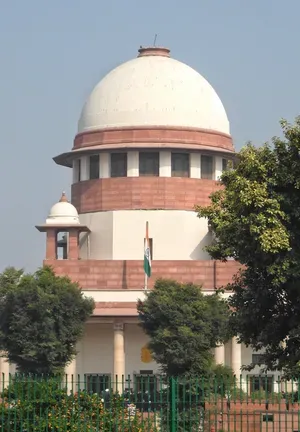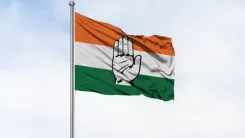Supreme Court's Constitutional Bench and Eight High Courts Live Stream Proceedings

New Delhi, Dec 5 (NationPress) Besides the Constitutional Bench of the Supreme Court, eight High Courts in the country are facilitating live streaming of court proceedings, allowing media representatives and other interested individuals to engage with them, as was communicated to the Rajya Sabha on Thursday.
The government informed the House that over six crore cases have been processed by virtual courts, with online fines exceeding Rs 649.81 crore collected until October 30, 2024, particularly for minor infractions like traffic violations.
Minister of State (independent charge) for the Ministry of Law and Justice, Arjun Ram Meghwal, responded to an inquiry indicating that, presently, live streaming of court proceedings is active in the High Courts of Gujarat, Gauhati, Orissa, Karnataka, Jharkhand, Patna, Madhya Pradesh, Uttarakhand, and the Constitutional Bench of the Supreme Court.
In response to a query by Vivek K. Tankha of the Congress, the Minister of State stated: “The live streaming of court proceedings is governed by the administrative authority of the respective High Courts and the Supreme Court of India. The Supreme Court has disseminated the Model Rules for Live Streaming and Recording of Court Proceedings to all High Courts.”
When asked whether the government has allocated specific funds to equip all courts in India with the necessary infrastructure for implementing live streaming, Meghwal stated, “As part of the eCourts Project Phase-III, an amount of Rs 112.26 crore has been designated for the Courtroom Live Audio-visual Streaming System (CLASS).”
In response to another inquiry from Subhash Barala of the BJP concerning enhancements in the Judicial Administration system, Meghwal mentioned that the 23rd Law Commission of India was established on September 2 to propose measures aimed at expediting case resolutions, lowering costs, and ensuring fair justice delivery.
The MoS shared that the law panel would also recommend measures for simplifying processes and court procedures and for harmonizing the rules of various High Courts to promote uniformity and ease of understanding and implementation.
Additionally, it will suggest steps for simplifying procedures to reduce and eliminate technicalities that cause delays.
In response to a question regarding Virtual Courts posed by Aditya Prasad of the BJP, the MoS explained that virtual courts have been encouraged to eliminate the necessity for litigants or lawyers to be physically present, enabling the adjudication of minor cases on a virtual platform.
“This concept has developed to efficiently utilize court resources and offer litigants an effective channel to resolve minor disputes while adhering to all judicial protocols,” he stated.
More than 6 crore cases have been managed by these virtual courts, with online penalties exceeding Rs 649.81 crore collected by October 30, 2024.
Claiming that the establishment of Virtual Courts is an administrative issue falling under the jurisdiction of the judiciary and the respective State Governments, the MoS noted that as of October 30, there are 27 Virtual Courts operational in 21 States/UTs, including Delhi (2), Haryana, Chandigarh, Gujarat (2), Tamil Nadu, Karnataka, Kerala (2), Maharashtra (2), Assam, Chhattisgarh, Jammu and Kashmir (2), Uttar Pradesh, Odisha, Meghalaya, Himachal Pradesh, Uttarakhand (2), Madhya Pradesh, Tripura, West Bengal, Rajasthan, and Manipur (2), specifically to manage traffic violation cases.





